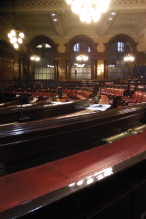Last call
 The deadline for responding to the Local Authorities (Functions and Responsibilities) Regulations consultation is fast approaching. Judith Barnes explains why it is very important for local authorities to comment on the proposed and, in some cases, unworkable changes.
The deadline for responding to the Local Authorities (Functions and Responsibilities) Regulations consultation is fast approaching. Judith Barnes explains why it is very important for local authorities to comment on the proposed and, in some cases, unworkable changes.
At the end of January 2015 the Department for Communities and Local Government issued a consultation on proposed changes to the Local Authorities (Functions and Responsibilities) (England) Regulations 2000 and requested comments to This email address is being protected from spambots. You need JavaScript enabled to view it. by close of business this Friday 6 March 2015.
Whilst the Government suggests that many of the changes are "technical" and will consolidate various regulations issued since 2000 (that will be welcomed) there are some wide ranging proposals that have been included within the consultation, without serious justification. Some of these proposed changes are unworkable and seem to represent some of the 'policy favourites' of the current Secretary of State for Communities and Local Government, particularly those changes requiring decisions to be taken by full Council on such matters a frequency of bin collections, car parking outsourcing and disposal of council land.
These changes will blur the lines between executive and non-executive governance; increase bureaucracy (requiring decisions to be taken twice) and potentially change the nature of Council meetings and their frequency in order to accommodate decision making, that should properly rest with the executive rather than the Council. The changes also fly in the face of the localism agenda. There is nothing preventing local authorities adding to the list of plans and strategies upon which decisions must be taken by full Council, however, to prescribe that a range of detailed decisions on individual matters should be taken by full Council undermines the very core of executive governance (whether through a Leader and Cabinet or Elected Mayor model). If most of the Council's power is supposed to lie with the executive then these changes appear to be wrong in principle.
We consider it completely inappropriate for property matters over any threshold to go to full Council (other than in very exceptional circumstances). The higher the limit the more significant may be the deal; there are bound to be leaks of confidential information and this could undermine relationships with developers and promote gazumping (even if the meeting is held in private). Councils do not generally wish to conduct business in Part II and it is likely to change the culture and very nature of the meetings. It is bound to be impractical to expect to get a decision from full Council on land disposal when Council may only meet infrequently (meetings are often bi-monthly). It also blurs the distinction between executive and non-executive decision-making and undermines the whole tenet of executive decision-making. No justification for doing this is put forward. (If this is a response to a couple of Tower Hamlets property deals, then it is wholly disproportionate.)
Likewise the reasons set out above apply to the other matters destined for full Council. They include: outsourcing functions under the Deregulation and Contracting Out Act 1994; the establishment of Combined Authorities and Economic Prosperity Boards; setting car parking charges; and waste collection frequencies... again they should remain executive functions. There seems to be no justification for distinguishing between any outsourcing and those under the Deregulation and Contracting Out Act 1994 – any outsourcing decisions should remain with the functional responsibility (whether executive or non-executive).
Health and Wellbeing Boards
The consultation document also states that the policy intention is for Health and Wellbeing Boards to be able to exercise any functions of their authorities, whether executive or non-executive (at paragraph 15). The proposed solution is to include in Schedule 2 of the regulations (which lists "local choice functions" i.e. functions which may be, but need not be, the responsibility of an authority's executive), the following additional provision: "22.the function of arranging under Section 196(2) of the Health and Social Care Act 2012 for a Health and Wellbeing Board established under Section 194 of that Act to exercise any functions that are exercisable by the authority".
This does not seem to achieve the desired objective. "Authority" functions are not "executive" functions, by their very nature, and so the above provision should mention the "executive" rather than the authority. Even that would not seem to go far enough, because the whole idea is that Health and Wellbeing Boards could exercise all sorts of different functions on behalf of a local authority where it had an impact on health and well-being – from leisure to housing to transport to youth services etc.
The provision might be better drafted to authorise the Health and Wellbeing Board to take decisions on any function of the executive that may affect the health and wellbeing of any person, to the extent that may be determined by the executive from time to time. If the Cabinet chooses which functions it delegates within certain parameters then this will provide a better local framework to facilitate delivery of place-based health and wellbeing functions.
We appreciate that many councils may already have responded to the consultation, but for those that have not, time is short. We would urge you to make representations on the above points, as well as any further issues in the consultation that you may wish to draw to the attention of the Secretary of State.
Judith Barnes is a Partner and Head of Local Government at DAC Beachcroft. She can be contacted on 07711 389412 or This email address is being protected from spambots. You need JavaScript enabled to view it..